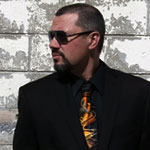Matthew McEver
In my writing classes, I emphasize the symbiotic relationship between reading and writing. On the first day of class, my students hear that the quality of our writing is a direct reflection of what kind of reader we’ve been until this point in our lives. Our writing tells the world what kind of readers we are.
When I’m not talking about writing, I’m usually talking about music, rock music — and many of my favorite bands wear their influences on their sleeves. Guns N’ Roses is on my mind right now, actually ringing in my ears from their show in Atlanta a few nights ago. When I listen to Guns N’ Roses, it’s apparent that the band built its musical vocabulary by listening to Iggy and the Stooges, early Aerosmith, Janis Joplin, the Sex Pistols, and the Rolling Stones, among others. On the literary side of things, when I read the fiction of someone like Cormac McCarthy, it’s obvious that he’s read…well, pretty much everything, but especially Melville, Twain, Joyce, Milton, Faulkner, O’Connor, and Dostoevsky.
Think about your own work. When people read your writing, what influences do they see? That question should terrify you. It terrifies me. I fear that I’ll be exposed. I’m embarrassed when I think of what I haven’t read, and my writing tells the world what kind of reader I am.
Bluntly speaking, some writers are lazy readers. Don’t take what I’m about to say as a swipe against current fiction. I have no issue with contemporary fiction. In fact, right now, I’m reading Viet Thanh Nguyen’s The Sympathizer, winner of the 2016 Pulitzer Prize. It’s a book that I should be reading. But I’ve yet to read War and Peace, and I feel guilty about it. I keep putting it off. We treat the classics like a chore, pushing aside Tolstoy or Conrad, reaching for something current, telling ourselves that we’re staying abreast of the trends. Besides, we trudged through Heart of Darkness in college.
Yet we read differently as we mature. I first read Conrad at nineteen, comparatively inexperienced at life. Back then, I considered Conrad the equivalent of eating my cultural spinach. Now, I practically meditate on passages from his work. The difference: back then, I was nineteen, and I wasn’t a writer.
Intimidated by the density and complexity of Faulkner or Conrad? Afraid of Virginia Woolf? Then it’s time to embrace the notion that there’s a lot of great writing that not only lends itself to multiple readings, but requires multiple readings. Do people really “get” Shakespeare the first time they hear it? Of course not. We have to think in terms of first-draft reading, second draft reading, third draft reading. I would never listen to a favorite album only once (especially a Guns N’ Roses album) and conclude that I “got” it. Yet we treat literature this way. We insist that literature be immediately accessible, that literature come down to our level. We call that route the path of least resistance, and there’s no artist worth his or her salt who ever took it.
Take a few minutes and jot down the titles that you’ve read this year, thus far. How challenging of a reading list do you have? Would you be proud to share it? Ideally, you want a reading list that helps you to move back and forth, staying in touch with your contemporaries while also drawing from work that has stood the test of time. And if you need inspiration, do some digging and discover who your favorite authors cite as their influences. What novels or collections inspired and informed their work?
Ultimately, when you’re not writing, then you should be reading, and what you choose to read becomes the DNA or your poetry or prose.
When all else fails, remember what Faulkner says: “Read, read, read. Read everything — trash, classics, good and bad, and see how they do it. Just like a carpenter who works as an apprentice and studies the master. Read! You’ll absorb it. Then write.”
 Matthew McEver is a Lecturer in the Department of English at the University of North Georgia and holds the MFA in Creative Writing from Converse College in South Carolina.
Matthew McEver is a Lecturer in the Department of English at the University of North Georgia and holds the MFA in Creative Writing from Converse College in South Carolina.
